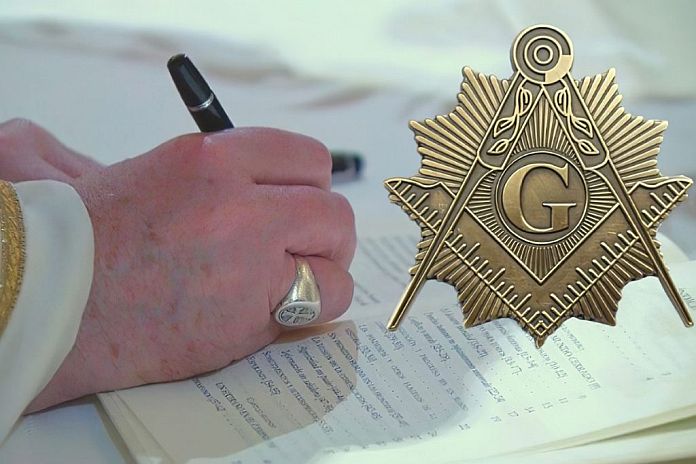By Blog
Since 1738 there has been a papal ban preventing Catholics from becoming Freemasons or joining other secret societies. It’s important to note that this is a ban instituted by the Catholic church and not the Freemason movement.
In this post, we look at the history of Catholicism and Freemasonry and understand why Catholics are prevented from joining the secret society before seeking to understand if reconciliation between the two is possible.
Are Catholics banned from becoming Freemasons?
In short, yes, Catholics are banned by the church from becoming Freemasons or joining any other secret society. This has been the case since 1738, when Pope Clement XII promulgated In Eminenti Apostolatus, in practice the first canonical prohibition of Masonic associations.
Since 1738, if a Catholic becomes a Freemason, they will be excommunicated by the church. This is the strictest penalty that can be imposed by the church, signifying just how against Freemasonry the Catholic institution is.
In 1983, many Catholics thought changes were coming regarding the ruling that Catholics were banned from becoming Masons, particularly in America. However, Cardinal Ratzinger put any doubt to bed by stating unequivocally that:
“The faithful who enrol in Masonic associations are in a state of grave sin and may not receive Holy Communion.”
To this day, the Catholic Church’s stance on Freemasonry hasn’t changed, and membership in both results in excommunication.
Why does the Catholic Church take this stance against Freemasonry?
To understand why the Catholic church is so against Freemasonry, we need to go back to the start of the secret society in the eighteenth century. At this time, the Grand Lodge of Freemasonry and the Grand Orient Freemasonry gained prominence at the same time.
The latter does not require members to believe in a supreme being, which is in direct contradiction to the Catholic Church’s fundamental teachings. In the eighteenth century, the Catholic church accused the society of promoting atheism and prohibited churchgoers from becoming members.
Regarding the Grand Lodge of Freemasonry, although there is a belief in a divine ‘Great Architect’ or ‘Supreme Being,’ discussion of religion within lodges is banned.
This is enough for many Masons who wish to be Catholics to argue that they should be allowed to participate in the rituals of the lodge, as they believe it is not in conflict with the religious teachings of the Catholic church. Unfortunately for them, throughout the centuries, Popes have disagreed and stood firmly behind the Papal ban on Freemasonry.
Fundamentally, the Catholic church believes that, at best, Freemasonry promotes religious indifferentism or the notion that all religions are of equal worth.
Even though the majority of Masons are traditionally from a white Protestant background, particularly in recent years, Freemasonry has opened its doors to those of many religions across the world.
For Catholics, this is evidence that Freemasonry, at the very least, does not recognize the importance of the belief in a Christian God, and at worst, accepts atheism as there is no requirement to discuss religious beliefs within ceremonies.
What does Freemasonry say about Catholics becoming members?
Although the Catholic church is staunch in its refusal to permit Catholics from becoming Freemasons, the same cannot be said for Freemasonry.
In fact, the United Grand Lodge of England states emphatically on their website that Roman Catholics are welcomed into Freemasonry, and that four Grand Masters of English Freemasonry have been Roman Catholics.
It seems that the ban on Catholics from becoming Freemasons is one-sided, rooted in the fear that Freemasonry detracts from the religious teachings of the church.
Freemasonry and the Catholic church: Is reconciliation possible?
The answer to this question isn’t straightforward, and it really depends upon who you ask. There is no desire to reconcile with Freemasonry for those in power within the Catholic Church, and there is still a ban on Catholics joining Masonic lodges.
Catholics interpret the Masonic teachings of rationalism and naturalism as a rival to its religious teachings. Freemasonry is open to people of all religions and irks the Catholic church, as they have historically put themselves on a pedestal, believing Catholicism to be the most essential global religion.
It must also be said that Catholicism is not the only Christian denomination to condemn Freemasonry, with Lutherans, Evangelicals, Pentecostals, and Baptists speaking out against the secret society. Many, however, have stopped short of excommunicating their members should they elect to join.
The truth of the matter is that a large proportion of Catholics view Freemasonry as dangerous and even comment that some of the Masonic rituals are Satanic and conspiratorial against the Catholic Church’s position.
Read more: Are Freemasons Satanic? 41 Myths Of Freemasonry
It appears that the only common ground between Catholicism and Freemasonry is the belief in a supreme being, but for Catholics, this isn’t enough to attempt any form of reconciliation.
Conclusion: Can Catholics be Freemasons?
While the Catholic church has banned Catholics from becoming Freemasons since 1738, many Catholics have become Masons over the past couple of centuries. As we have learned, the Grand Lodge of England actually encourages Roman Catholics to become Masons, referring to the four Grand Masters who have been members of the Catholic church.
It seems that the decision of whether to become a Mason is a personal one. If a Catholic is willing to risk excommunication from their church, they will be welcomed into Freemasonry as an equal, like any other person of a different religion.
Simply, it seems that the problem lies with the Catholic church, and they are unlikely to change their stance any time in the near future.






